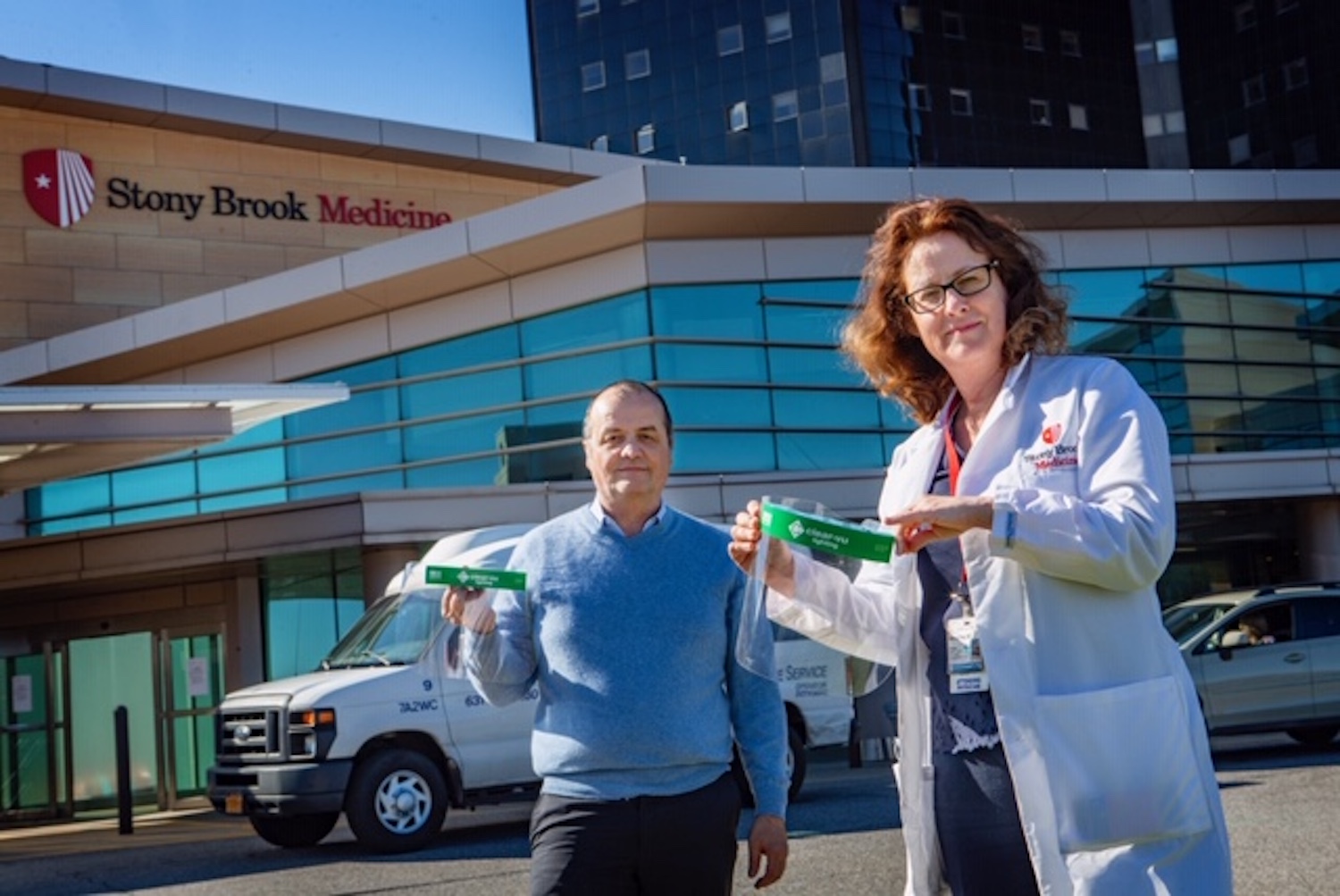Stony Brook Conducts Clinical Trials

A number of clinical trials have been, or soon will be launched by Stony Brook Medicine. They were designed to identify effective therapies for the most critically ill patients.
Remdesivir — developed to treat two other RNA viruses, Ebola and Marburg — has been tested and appears to be effective in treating COVID-19 in China and in Washington state. Under the leadership of Dr. Sharon Nachman, chief of the Division of Pediatric Infectious Diseases at Stony Brook Children’s Hospital, Stony Brook Medicine has administered Remdesivir to two patients with severe COVID-19. Her team is now attempting to become part of the clinical trial run by the drug’s manufacturer, Gilead Sciences.
Remdesivir, a nucleotide analogue, which can be used in therapeutic drugs and include a range of antiviral products used to prevent viral replication in infected cells, blocks viral reverse transcriptases, or enzymes used to generate complementary DNA from an RNA template.
Nachman said Stony Brook University has been in a positive position from the start despite the panic buying exacerbating the situation.
“The hospital is very up-to-date and ready and able and willing to do exactly what it needs,” she said. “There’s no suggestion that we can’t handle this or we don’t have enough. We have enough and we have what it takes to take care of our patients in the hospital, in the community, and all of our outreach areas. Our staff is showing up and doing more and above than what they’re asked to do. The hospital is incredibly well-positioned, and from the top down and the bottom up staff and faculty are working together.”
While the novel coronavirus can be deadly to some, Nachman called for calm, adding based on data there is currently no change or mutation in the virus.
“Don’t panic. I think the current feeling out there on the street, in the neighborhood, at the supermarkets, is everybody running around and panicking,” Nachman said. “More than 80 percent of the patients who will get this infection will come out totally well. They will not require emergency room care, nor hospitalization, nor intensive care unit care. Yes, we expect that pretty much everyone will get it, but the vast majority of people who will get it will be well.”
Elliott Bennett-Guerrero, medical director for perioperative quality and patient safety for Stony Brook Medicine, said based on similar studies in China that showed promise, Stony Brook Medicine anticipates launching a clinical trial of donated, post-convalescent plasma from COVID-19 patients very soon, based on the level of antibody titers to SARS-CoV2 in the donor plasma. Serum or plasma therapy for infectious diseases dates to the 1890s, when serum made from immunized animals provided the first effective treatment for Clostridium tetani and Corynebacterium diphtheriae.
Stony Brook University professor Lily Mujica-Parodi has been part of a national effort to employ a wearable technology device — Oura — to collect sufficient physiological data, and use deep learning algorithms to predict the onset of SARS-CoV2 infection. This type of device would be most productive and predictive in hospitals like Stony Brook, where there is a large number of healthcare workers in high-risk-for-infection roles.
When it comes to developing a vaccine, Nachman said that’s a $64,000 question.
“Developing a vaccine is not easy,” she said. “The first thing you need to do in order to develop a vaccine is to be able to say this is the part of the virus that you made an antibody to, and it protected you, so, without those kind of surrogate markers, it’s going to be hard to develop a vaccine. Right now, they’re being based on hypotheses of which part of the virus it is that’s causing the illness that you need an immune response to protect you.”
Face Shield Production
Dr. Bettina Fries, a professor of medicine, molecular genetics, and microbiology, and chief of the Division of Infectious Diseases, has a neighbor, Agjah Libohova, who is a research and development specialist at a local manufacturing company. She approached him with the idea that the company he works for could make a prototype of the face shield she uses. Agjah borrowed the face shield and developed a prototype that fits guidelines for use in a medical facility. He then worked with the CEO of the company, Clear-Vu Lighting, to develop the product. They are now working on a way to mass-produce the face shields for caregivers.
Manufacturing is beginning with an order of 20,000 new face shields that will be deployed to Stony Brook University Hospital. The prototype has been further developed for an easy fit and mass production, which is expected to start by early this month. Clear-Vu Lighting is gearing up with an expectation to produce 40,000 face shields per day and approximately 1.2 million per month. Production of face shields to Stony Brook will include supplies for Stony Brook University Hospital and all affiliated hospitals on Long Island.
Ventilator Preparation
Due to the projections of the COVID-19 pandemic, Stony Brook University Hospital is proactively preparing should a ventilator shortage and surge occur. In a Stony Brook Medicine research laboratory, medical professionals are working on ventilating multiple patients with one ventilator, as a last resort if or when ventilators are in short supply. Putting two patients on one ventilator requires matching patients with similar characteristics — sex, height, age, and lung sizes — to avoid one patient being over ventilated and the other being under ventilated, and in order to safely care for suspected or confirmed coronavirus patients.
At Stony Brook Medicine, researchers and doctors are examining the forces that cause unequal distribution of lung volumes and airway pressures, while using complex test models of diseased lungs.
In 72 hours, Southampton Village Mayor Jesse Warren and his group raised well over $300,000 for Stony Brook Southampton Hospital — more than the cost of five ventilators.
Growing Staff Need
Having now met all graduation requirements, the Renaissance School of Medicine at Stony Brook University is allowing senior medical students to graduate in early April so they might begin their professional career as a physician at Stony Brook University Hospital. They will be able to work under the supervision of residents, fellows, and attending physicians to address the growing number and complexity of patients being admitted to the hospital. Graduates could then proceed to begin their residencies July 1.
desiree@indyeastend.com



